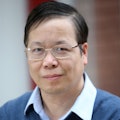Computational Mechanics and Engineering AI Research Group
Modelling techniques and computational methods for advanced engineering of materials, solids and structures.
Computational Mechanics and Engineering AI (CMAI) research group has established their international stands on developing next generation smart computational engineering solutions to enable the digital transformation for built environment. CMAI’s physics and mechanics informed Engineering AI, which is data-driven, enabling smart materials, structure and digital twin development, aligns well with major funding priorities. The research substantializes domain-oriented AI algorithms, to make a breakthrough towards generic, responsible and explainable AI, to enable human-centered digitalization for the built environment.
CMAI focus on three main areas:
- Computational models for advanced smart materials
- Computational models for advanced structures and meta-structures
- Advanced BIM and Physics informed Digital Twins
The first one, in short, Smart Materials, involves state of the art topics such as modelling of micro- and nano-structured materials and composites, electroactive materials, biological materials*, quasicrystals* and architected meta-materials*, which means we can produce bespoke manmade new materials to help achieving net-zero sustainable built environment.
Regarding the second, in short, Smart Structures, the topics are composite aerospace structures, finite elements method for multiscale problems*, robust aircraft design optimisation, uncertainty quantification and management in engineering applications*, smoothed-particle hydrodynamics for modelling flow of particulate composites, modelling of meta-structures for elastic waves*, structural dynamics*, dynamical systems, elastic waves propagation and absorption*, structural optimization, topological mechanics*, which means we can understand and produce novel and sustainable structural at all scales to help achieving long lasting and sustainable built environment.
The third area, Digital Twins, focuses on the pioneering physics informed data driven engineering AI and their applied smart engineering applications, including Symbolic Mathematics, Game Playing, Neutral Networks, Expert Systems, Fuzzy Logic, Robotics and Natural Language Processing*; multi-dimensional BIM data, information and knowledge processing*; Large scale smart engineering computing, data analytics and optimization*; and Knowledge based/cognitive modelling and artificial intelligence supported holistic decision making*, which means we can understand super complex engineering issues and produce holistic and systems approach to enable human centred digitalization.
In all those topics the group is present at a level recognised as at least internationally excellent. Those indicated with * are trendy topics that are attracting most of the attention of the world-leading research centres.
Research
We are currently carrying out a variety of research projects in the following areas.
Computational models for advanced smart materials
- Modelling of electro and magneto-active materials (actuation and energy harvesting).
- Modelling of advanced micro- and nano-structured materials.
- Modelling of cellular, porous, fibrous composite materials.
- Modelling the mechanical behaviour biological materials.
- Investigation of dynamic properties of quasicrystalline and quasiperiodic structures.
Computational models for advanced structures and meta-structures
- Advanced finite element methods for nonlinear and multiscale problems in solid and fluid mechanics
- Analysis and optimum design software for composite aerospace structures.
- Development of robust and reliable meta-modelling approaches for inverse problems and optimisation.
- Robust aircraft design optimisation.
- Uncertainty quantification and management (UQ&M) in engineering applications.
- Smoothed-particle hydrodynamics (SPH) for modelling flow of particulate composites.
- Meta-structures and cloaking of flexural waves.
- Vibration based damage detection in mechanical and aerospace structures.
- Fast dynamics computational methods for crash and impact analysis, material fracture and explosion modelling.
- Finite-element modelling of high performance fibre reinforced cementitious composites.
Our partners
We are currently working with the following partners:
Universities and research centres
- University of Bristol
- Swansea University
- University of Glasgow
- University of Liverpool
- Technion-Haifa
- University of California at S Barbara
- University of Luxembourg
- Polish Academy of Sciences
- University of Pisa
- University of Trento
- University of Copenhagen
- Umeå University
- Harbin Institute of Technology
- Tsinghua University
- Dalian University of Technology
- Shanghai Jiaotong University
- University of Waikato
Companies
- Airbus
- Cintec Ltd
Meet the team
Schools
Next steps
Research that matters
Our research makes a difference to people’s lives as we work across disciplines to tackle major challenges facing society, the economy and our environment.
Postgraduate research
Our research degrees give the opportunity to investigate a specific topic in depth among field-leading researchers.
Our research impact
Our research case studies highlight some of the areas where we deliver positive research impact.



